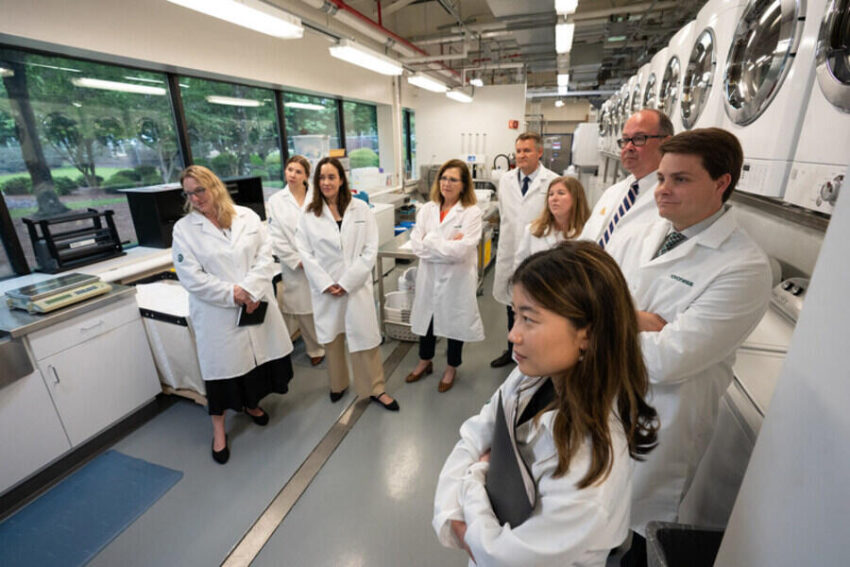Sunday, June 8, 2025

Michelle Rozo, Vice Chair of the National Science and Technology Council’s Biotechnology Education and Outreach Board (NSCEB), kicked off the Biotech Across America roadshow in North Carolina, marking the beginning of an exciting journey to discover the nation’s biotechnology landscape. The roadshow aims to highlight the crucial role biotechnology plays across the U.S., shining a spotlight on the companies, academic institutions, industry alliances, workforce development programs, and policy initiatives driving the industry’s rapid growth. The NSCEB is committed to engaging with key stakeholders, sharing valuable insights, and learning firsthand about the innovative efforts being made to advance biotechnology in diverse regions of the country.
“The Commission’s job is far from finished,” said Dr. Michelle Rozo, Vice Chair of the NSCEB. “We are taking our report on the road and continuing the conversation with the people across America doing biotech work everyday. Together we can strengthen this vital ecosystem and advance our national and economic security.”
As the NSCEB embarks on this nationwide tour, Vice Chair Rozo and other commissioners are focused on deepening their understanding of the work being done to move the biotechnology industry forward. The roadshow will feature in-depth discussions about the findings and recommendations from the Commission’s recent report to Congress, allowing the group to learn from local leaders while reinforcing national collaboration and progress within the biotech sector.
The first stop of the roadshow was in Raleigh, North Carolina, where Vice Chair Rozo began her visit with a strategic discussion with leaders from the North Carolina Biotechnology Center (NCBiotech). This meeting focused on evaluating the current state of North Carolina’s biotechnology industry, which is known for its robust ecosystem and significant contributions to the national biotech landscape. The Vice Chair took this opportunity to learn more about the state’s role in advancing biotech research, development, and manufacturing, gaining insights from the leading minds driving innovation in the field.
Rozo also met with the Co-Chairs of the North Carolina General Assembly’s Life Sciences Caucus, participating in discussions that highlighted the state’s robust legislative backing for biotech initiatives. During this leg of the visit, Vice Chair Rozo and local leaders discussed the unique challenges and opportunities faced by the state, particularly around workforce development and how North Carolina’s biotech manufacturing capabilities are contributing to national success.
In addition to these meetings, Vice Chair Rozo participated in a roundtable with representatives from both industry and academia, further emphasizing the collaborative efforts that are needed to propel the biotech industry forward. The discussion centered on North Carolina’s leadership in biopharma manufacturing and how the state is playing a crucial role in shaping workforce development across the country. The collective work being done to improve training programs, create job opportunities, and expand industry capacity was highlighted as a model for national progress.
The following day, Vice Chair Rozo and the NSCEB team traveled to Franklinton, North Carolina, where they toured the Novonesis enzyme manufacturing facility. This visit provided the group with an opportunity to explore recent innovations in agricultural biotechnology, a critical area for addressing national security concerns, economic independence, and the sustainability of agriculture. The discussions held during the tour focused on how these advancements are contributing to the resilience of the agricultural sector, and how biotechnology is positioned to play an integral role in addressing future challenges related to food security and sustainability.
The trip wrapped up with a presentation of local biotech innovations, where representatives from North Carolina’s agricultural and industrial biotechnology sectors highlighted their groundbreaking projects. The event provided Vice Chair Rozo and the NSCEB team with a deeper understanding of how the state’s thriving biotech industry is making a national impact through groundbreaking technologies and innovations. This stop on the roadshow not only showcased the vital contributions of North Carolina to the field but also emphasized the collaborative efforts that are shaping the future of biotechnology across the United States.
“For more than 40 years, NCBiotech and the state of North Carolina have been strategically investing in biotechnology and the life sciences,” said Doug Edgeton, president and CEO of NCBiotech. “Given this critical moment for advancing U.S. leadership in biotechnology for national security and economic resilience, North Carolina is well positioned to execute on the Commission’s recommendations, particularly around biomanufacturing, training, and domestic onshoring of critical supply chains for healing, feeding, and fueling the world.”
“The proactive measures proposed by the National Security Commission underscore a pivotal moment, not just a vision for a bio-based future, but the recognition that biotechnology and biosolutions are already shaping our world today,” said Tue Micheelsen, President of Novonesis North America. “The tools to solve complex challenges and improve lives exist now, we simply need to amplify and extend them to reach everyone. At Novonesis, we are committed to accelerating this momentum, working to ensure these powerful innovations benefit communities everywhere. We invite all stakeholders, from policymakers to local leaders, to join us in expanding access to biology-driven solutions. Together, we can build a more sustainable, secure, and prosperous world.”
“The life sciences industry in North Carolina has been built on a strong foundation of support from our state legislature, municipalities and colleges and universities,” said NCLifeSci President Laura Gunter. “The state’s focus and foresight has built North Carolina into one of the nation’s leading hubs for agricultural technology, defense, biotechnology and pharmaceuticals.”

